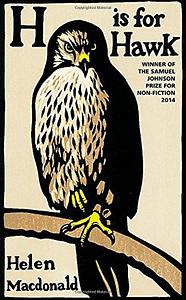Take a photo of a barcode or cover
I found this book very intriguing. I knew nothing about hawks before reading it - and I probably wouldn't pick up a book just about hawks, but I was fascinated Macdonald's story of training a hawk as part of her grieving process after her father's death. She writes with such openness about her experiences and such respect for hawks. It's quite a wonderful book.
I loved everything about this book. The prose was gripping (no pun intended) and mesmerizing and so were the subjects at hand. Loss, depression and falconry! Unexpected combination, at least for me.
I was immediately drawn into the book and simply couldn’t put it down. Now I have watched goshawks online just to see how they fly, just to see (but not feel) what they are. A riot of emotions and passion in this story. Color me impressed.
I was immediately drawn into the book and simply couldn’t put it down. Now I have watched goshawks online just to see how they fly, just to see (but not feel) what they are. A riot of emotions and passion in this story. Color me impressed.
Had I not read this with a friend I highly doubt I’d have ever picked it up. I’m glad I did, though I didn’t often agree with the conclusions the author had in her rumination predominately about her buying a hawk in a fit of processing the complex grief she is experiencing from her father passing. In a way it is a exorcism that takes place during the training and subsequent excursions. She goes back and forth on the ethics, antiquity of the practice, and various takeaways from her being pretty legitimately unhinged from the decision and it’s ramifications.
Unfortunately, it straddles her experiences with that of White, the author of The Once and Future King—a book I did not remotely enjoy, nor want to know more about. Boy, she is enamoured with the authors life experience and how it relates to what he wrote, and, of course, his own granular, inexperienced journey in getting and “training” a hawk, too. I can see why it’s there… but I just was not interested in it; certainly not in that granular a detail.
As mentioned, I also found myself shaking my head at her conclusions. She gets close to the idea of maybe it being archaic and foolish and kind of shitty to own a hawk. The damn things get “lost” all the time, aka, they don’t want to be controlled by a human because they’re animals? I don’t think what she does is particular ethical. As mentioned, for much of this, she is not in her right mind, though. Im not sure that excuses her behaviour, since I don’t know much about what would happen to these hawks people attempt to obtain. Would it never have been caught? Or would someone else just have the Hawk she got from the guy?
Regardless, I thought she had a fascinating mind and enjoyed her kind of writing. What she was interested in, when not intersecting with White, I found fairly captivating. She is quite the character, probably in part because her experience was so far removed and she was a wild thing. And her revelation about why the hawk was an imperative was well done, so I found this far better than it had any right to be. I see a few people disliked it because of the conceit of her subjugating an animal and I understand that, but I thought about all the fiction and nonfiction I’ve enjoyed before: None of them had characters doing things I would do or agreed with. In part, I think that is the point of this story.
Unfortunately, it straddles her experiences with that of White, the author of The Once and Future King—a book I did not remotely enjoy, nor want to know more about. Boy, she is enamoured with the authors life experience and how it relates to what he wrote, and, of course, his own granular, inexperienced journey in getting and “training” a hawk, too. I can see why it’s there… but I just was not interested in it; certainly not in that granular a detail.
As mentioned, I also found myself shaking my head at her conclusions. She gets close to the idea of maybe it being archaic and foolish and kind of shitty to own a hawk. The damn things get “lost” all the time, aka, they don’t want to be controlled by a human because they’re animals? I don’t think what she does is particular ethical. As mentioned, for much of this, she is not in her right mind, though. Im not sure that excuses her behaviour, since I don’t know much about what would happen to these hawks people attempt to obtain. Would it never have been caught? Or would someone else just have the Hawk she got from the guy?
Regardless, I thought she had a fascinating mind and enjoyed her kind of writing. What she was interested in, when not intersecting with White, I found fairly captivating. She is quite the character, probably in part because her experience was so far removed and she was a wild thing. And her revelation about why the hawk was an imperative was well done, so I found this far better than it had any right to be. I see a few people disliked it because of the conceit of her subjugating an animal and I understand that, but I thought about all the fiction and nonfiction I’ve enjoyed before: None of them had characters doing things I would do or agreed with. In part, I think that is the point of this story.
I enjoyed this book immensely. It's an incredibly well-written novel that miraculously weaves together grief, falconry, and the life of T.H. White. I can honestly say I've never read anything like it.
Listened to on audio. This unique book was so very interesting and vivid and a touch thought provoking, and that’s all I really have to say.
This books is about grief and how the end of one chapter is the beginning of another. It's facinating to learn so deeply about falconing and goshawks, but the reason I kept turning the page is the way Macdonald honestly described her frantic feelings after her dad passed away. The hawk is not only the way she gets past her father's death, but its the objectification of her grief. The major take away is about the power of letting go.
challenging
emotional
informative
reflective
sad
fast-paced
The book starts with the author driving down to an abandoned East Anglia airfield which has now been reclaimed by nature to look for hawks. Not any hawk, but the goshawk- the most magnificent of them all. She becomes the young girl who is taught to wait patiently by her father because the things worth seeing come only if you wait. After her darshan of a pair of goshawks flying high in the sky, she finds a tuff of reindeer moss clutched in her hand. She takes the moss home, and she was looking at it when the fateful phone call came announcing that her father was dead. A few weeks later she brings a goshawk home, hoping that training the goshawk would help her come to terms with her grief.
The two main strands of the book are about her relationship with the goshawk and of how she navigates the terrain of grief. But interwoven through it is also the story of how T.H. White tried to escape who he was by attempting to train a goshawk, and the story of her own father, a photographer famous for waiting for the right photograph to come to him.
I particularly loved the parts where she gradually establishes a relationship with Mabel, her goshawk; she becomes the goshawk, and the goshawk becomes her (when the goshawk is flying, she can literally see herself from Mabel's vantage point), and her musings on her father were so like my own in a similar situation. It was almost inevitable that she would finally understand that hands are not just just meant to hold hawks but also to hold people tight.
I can understand why she brought in the bits about White, and while I enjoyed reading some of her musings on children's literature, I personally felt the book would have held faster without it. Mabel, the author, her father and her family and friends was all I really wanted from the book. There were mediations on the inherent classism of hunting in the UK which I would have loved her to elaborate on. I also learnt more about falconry than I ever thought existed!
The timeline of the book extends for less than a year, and the story ends with the end of the first season of hunting with Mabel. What I found interesting was that the book was written seven years later after Mabel herself passed away. Was it an account of her grief at losing her father, or was it also tempered with the grief of losing her mate?
The two main strands of the book are about her relationship with the goshawk and of how she navigates the terrain of grief. But interwoven through it is also the story of how T.H. White tried to escape who he was by attempting to train a goshawk, and the story of her own father, a photographer famous for waiting for the right photograph to come to him.
I particularly loved the parts where she gradually establishes a relationship with Mabel, her goshawk; she becomes the goshawk, and the goshawk becomes her (when the goshawk is flying, she can literally see herself from Mabel's vantage point), and her musings on her father were so like my own in a similar situation. It was almost inevitable that she would finally understand that hands are not just just meant to hold hawks but also to hold people tight.
I can understand why she brought in the bits about White, and while I enjoyed reading some of her musings on children's literature, I personally felt the book would have held faster without it. Mabel, the author, her father and her family and friends was all I really wanted from the book. There were mediations on the inherent classism of hunting in the UK which I would have loved her to elaborate on. I also learnt more about falconry than I ever thought existed!
The timeline of the book extends for less than a year, and the story ends with the end of the first season of hunting with Mabel. What I found interesting was that the book was written seven years later after Mabel herself passed away. Was it an account of her grief at losing her father, or was it also tempered with the grief of losing her mate?
Graphic: Violence, Grief
emotional
inspiring
reflective
sad
medium-paced
only mildly enjoying it. stopped half way but may pick it up again later
dark
emotional
informative
mysterious
reflective
medium-paced
I got through this book very quickly, I found it really gripping. I found it quite dark and almost haunting at times, but really well written, and informative as well. I wasn't expecting to read so much about T H White, but the biographical elements linked really well and were very interesting. I was really moved.


